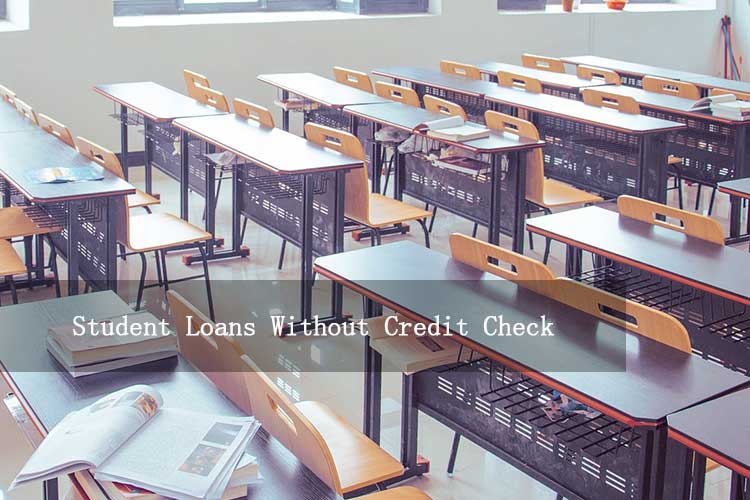
Navigating student loans can feel overwhelming, particularly if you lack a credit history or have difficulty finding a cosigner. Fortunately, there are various loan options available, particularly federal student loans, student loans without credit check. These loans aim to support students in concentrating on their studies without the burden of their financial history.
In this article, we will delve into the types of student loans that don’t require a credit check, explore alternative funding options, and provide tips for managing your loans effectively to minimize financial stress after you graduate.
Do All Student Loans Require a Credit Check?
The simple answer is no. Although most private student loans necessitate a credit check, federal student loans can be obtained without any examination of your credit history. Federal loans focus on being accessible, allowing students from various backgrounds—regardless of their credit status—to pursue higher education.
Student loans without credit checks are typically provided by the government, making them an excellent option for those starting their financial journey with little to no credit history.
Federal Student Loans Without Credit Check
The best place to look for student loans without credit checks is the U.S. Department of Education. Here are the top federal loans that do not involve any credit screening:
1. Direct Subsidized Loans
- Who it’s for: Undergraduate students with financial need.
- Key benefit: Interest is covered by the government while you’re in school.
- Loan amount: Varies by year and student status.
Direct Subsidized Loans are ideal if you need financial aid and want to avoid interest accrual during your studies. They don’t require a credit history, making them perfect for students with no prior financial experience.
2. Direct Unsubsidized Loans
- Who it’s for: Undergraduate, graduate, and professional students.
- Key benefit: No financial need required to qualify.
- Loan amount: Higher limits than subsidized loans.
Direct Unsubsidized Loans are available to all students, regardless of financial need or credit score. These loans charge interest from the moment they’re disbursed, so it’s helpful to start making payments early if possible.
3. Federal PLUS Loans (with Exceptions)
- Who it’s for: Graduate students and parents of undergraduates.
- Key benefit: No minimum credit score, but adverse credit history may disqualify some borrowers.
While Parent PLUS and Grad PLUS loans involve a soft credit review, they are still accessible to most borrowers since they don’t require a high credit score.
What About Private Student Loans?
Private student loans are offered by banks, credit unions, and online lenders, but most require a credit check. If you don’t have a good credit score or a cosigner with strong credit, it can be difficult to qualify for these loans. However, some private lenders are starting to offer alternative loans based on income potential rather than credit history.
Be cautious when taking out private loans without a credit check—these often come with higher interest rates and less flexible repayment options.
Alternatives to Student Loans Without Credit Check
If federal loans aren’t enough to cover your tuition and living expenses, consider these alternatives to reduce your reliance on private loans:
1. Scholarships and Grants
Scholarships and grants are free money that doesn’t need to be repaid. Many are awarded based on merit, need, or specific criteria like academic achievement, sports participation, or community involvement. Apply for scholarships through:
- FAFSA (for federal grants)
- Institutional aid through your school
- Private organizations and charities
2. Income-Share Agreements (ISAs)
Some schools and organizations offer ISAs as an alternative to traditional student loans. With an ISA, you receive funding for your education, and in return, you agree to repay a percentage of your future income for a fixed number of years.
ISAs don’t involve a credit check, but they do come with risks—if your income isn’t high enough after graduation, you could end up paying more over time.
3. Work-Study Programs
If you’re eligible for federal work-study, you can earn money while studying. These programs provide part-time jobs, often on campus, to help cover tuition and living expenses without taking on more debt.
4. School Payment Plans
Many schools offer tuition installment plans that allow you to spread payments across the semester or academic year. This can help reduce your reliance on loans altogether.
How to Apply for Federal Loans Without a Credit Check
The process of applying for federal student loans is straightforward:
- Fill out the FAFSA: The Free Application for Federal Student Aid (FAFSA) determines your eligibility for federal loans, grants, and work-study programs.
- Receive your financial aid package: Your school will send you a breakdown of loans, grants, and scholarships you qualify for.
- Choose the right loan: You can accept or decline parts of your financial aid offer based on your needs.
- Complete entrance counseling: If it’s your first time borrowing federal loans, you’ll need to complete a brief online counseling session.
- Sign the Master Promissory Note: This legally binding agreement outlines the terms and conditions of your loan.
Tips for Managing Student Loans Effectively
Even if you qualify for student loans without credit checks, it’s important to manage your debt wisely. Here are some tips to set yourself up for success:
1. Borrow Only What You Need
It’s tempting to borrow the full amount offered, but try to only take what’s necessary to cover tuition and essential expenses. This will reduce the amount you owe after graduation.
2. Start Repaying Early
If you can, start making small payments while you’re still in school. This will help reduce the overall interest you accumulate.
3. Explore Loan Forgiveness Programs
If you’re planning to work in public service or education, look into programs like Public Service Loan Forgiveness (PSLF) or Teacher Loan Forgiveness. These can cancel a portion of your loans after a certain number of qualifying payments.
4. Consider Income-Driven Repayment Plans
Federal loans offer income-driven repayment (IDR) plans that adjust your monthly payments based on your income. This ensures your payments remain affordable, even if your post-graduation salary is lower than expected.
FAQs
1. Can I get private student loans without a credit check?
Some lenders offer no-credit-check private loans, but these typically have higher interest rates and stricter repayment terms.
2. How do income-share agreements compare to student loans?
ISAs are an alternative to loans, with repayments based on a percentage of your income. However, they may not always be cheaper in the long run.
3. What if I can’t repay my federal loans after graduation?
You can explore income-driven repayment plans or request deferment or forbearance to temporarily pause your payments.
Conclusion: Finding the Right Loan Without a Credit Check
If you’re looking for student loans without credit checks, federal student loans are the way to go. They offer flexible repayment plans, low interest rates, and opportunities for loan forgiveness. If federal loans don’t fully meet your needs, look into scholarships, income share agreements (ISAs), or work-study programs to help cover the difference.
Keep in mind that the secret to financial success is to only borrow what you truly need, investigate your repayment options, and manage your loans responsibly after you graduate. With some thoughtful planning, you can finance your education without worrying about your credit history.



